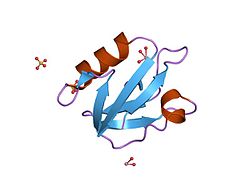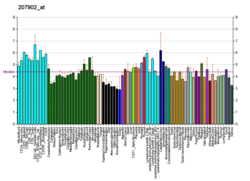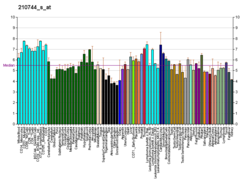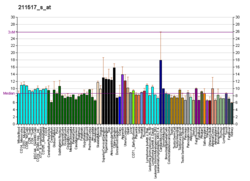Interleukin 5 receptor alpha subunit
Interleukin 5 receptor, alpha (IL5RA) also known as CD125 (Cluster of Differentiation 125) is a subunit of the Interleukin-5 receptor. IL5RA also denotes its human gene.[5]
Function
[edit]The protein encoded by this gene is an interleukin 5 specific subunit of a heterodimeric cytokine receptor. The receptor is composed of a ligand specific alpha subunit and a signal transducing beta subunit shared by the receptors for interleukin 3 (IL3), colony stimulating factor 2 (CSF2/GM-CSF), and interleukin 5 (IL5). The binding of this protein to IL5 depends on the beta subunit. The beta subunit is activated by the ligand binding, and is required for the biological activities of IL5. This protein has been found to interact with syndecan binding protein (syntenin), which is required for IL5 mediated activation of the transcription factor SOX4. Six alternatively spliced transcript variants encoding three distinct isoforms have been reported.[5]
Interactions
[edit]Interleukin 5 receptor alpha subunit has been shown to interact with:
See also
[edit]References
[edit]- ^ a b c GRCh38: Ensembl release 89: ENSG00000091181 – Ensembl, May 2017
- ^ a b c GRCm38: Ensembl release 89: ENSMUSG00000005364 – Ensembl, May 2017
- ^ "Human PubMed Reference:". National Center for Biotechnology Information, U.S. National Library of Medicine.
- ^ "Mouse PubMed Reference:". National Center for Biotechnology Information, U.S. National Library of Medicine.
- ^ a b "Entrez Gene: IL5RA interleukin 5 receptor, alpha".
- ^ Woodcock JM, Zacharakis B, Plaetinck G, Bagley CJ, Qiyu S, Hercus TR, Tavernier J, Lopez AF (Nov 1994). "Three residues in the common beta chain of the human GM-CSF, IL-3 and IL-5 receptors are essential for GM-CSF and IL-5 but not IL-3 high affinity binding and interact with Glu21 of GM-CSF". EMBO J. 13 (21): 5176–85. doi:10.1002/j.1460-2075.1994.tb06848.x. PMC 395466. PMID 7957082.
- ^ Johanson K, Appelbaum E, Doyle M, Hensley P, Zhao B, Abdel-Meguid SS, Young P, Cook R, Carr S, Matico R (Apr 1995). "Binding interactions of human interleukin 5 with its receptor alpha subunit. Large scale production, structural, and functional studies of Drosophila-expressed recombinant proteins". J. Biol. Chem. 270 (16): 9459–71. doi:10.1074/jbc.270.16.9459. PMID 7721873.
- ^ Murata Y, Takaki S, Migita M, Kikuchi Y, Tominaga A, Takatsu K (Feb 1992). "Molecular cloning and expression of the human interleukin 5 receptor". J. Exp. Med. 175 (2): 341–51. doi:10.1084/jem.175.2.341. PMC 2119102. PMID 1732409.
- ^ Ogata N, Kouro T, Yamada A, Koike M, Hanai N, Ishikawa T, Takatsu K (Apr 1998). "JAK2 and JAK1 constitutively associate with an interleukin-5 (IL-5) receptor alpha and betac subunit, respectively, and are activated upon IL-5 stimulation". Blood. 91 (7): 2264–71. doi:10.1182/blood.V91.7.2264. PMID 9516124.
- ^ Cen O, Gorska MM, Stafford SJ, Sur S, Alam R (Mar 2003). "Identification of UNC119 as a novel activator of SRC-type tyrosine kinases". J. Biol. Chem. 278 (10): 8837–45. doi:10.1074/jbc.M208261200. PMID 12496276.
- ^ Geijsen N, Uings IJ, Pals C, Armstrong J, McKinnon M, Raaijmakers JA, Lammers JW, Koenderman L, Coffer PJ (Aug 2001). "Cytokine-specific transcriptional regulation through an IL-5Ralpha interacting protein". Science. 293 (5532): 1136–8. doi:10.1126/science.1059157. PMID 11498591. S2CID 28003281.
Further reading
[edit]- Isobe M, Kumura Y, Murata Y, Takaki S, Tominaga A, Takatsu K, Ogita Z (1992). "Localization of the gene encoding the alpha subunit of human interleukin-5 receptor (IL5RA) to chromosome region 3p24-3p26". Genomics. 14 (3): 755–8. doi:10.1016/S0888-7543(05)80180-6. PMID 1427903.
- Tuypens T, Plaetinck G, Baker E, Sutherland G, Brusselle G, Fiers W, Devos R, Tavernier J (1993). "Organization and chromosomal localization of the human interleukin 5 receptor alpha-chain gene". Eur. Cytokine Netw. 3 (5): 451–9. PMID 1477296.
- Tavernier J, Tuypens T, Plaetinck G, Verhee A, Fiers W, Devos R (1992). "Molecular basis of the membrane-anchored and two soluble isoforms of the human interleukin 5 receptor alpha subunit". Proc. Natl. Acad. Sci. U.S.A. 89 (15): 7041–5. Bibcode:1992PNAS...89.7041T. doi:10.1073/pnas.89.15.7041. PMC 49641. PMID 1495999.
- Scott HS, Guo XH, Hopwood JJ, Morris CP (1992). "Structure and sequence of the human alpha-L-iduronidase gene". Genomics. 13 (4): 1311–3. doi:10.1016/0888-7543(92)90053-U. PMID 1505961.
- Murata Y, Takaki S, Migita M, Kikuchi Y, Tominaga A, Takatsu K (1992). "Molecular cloning and expression of the human interleukin 5 receptor". J. Exp. Med. 175 (2): 341–51. doi:10.1084/jem.175.2.341. PMC 2119102. PMID 1732409.
- Tavernier J, Devos R, Cornelis S, Tuypens T, Van der Heyden J, Fiers W, Plaetinck G (1991). "A human high affinity interleukin-5 receptor (IL5R) is composed of an IL5-specific alpha chain and a beta chain shared with the receptor for GM-CSF". Cell. 66 (6): 1175–84. doi:10.1016/0092-8674(91)90040-6. PMID 1833065. S2CID 54277241.
- Johanson K, Appelbaum E, Doyle M, Hensley P, Zhao B, Abdel-Meguid SS, Young P, Cook R, Carr S, Matico R (1995). "Binding interactions of human interleukin 5 with its receptor alpha subunit. Large scale production, structural, and functional studies of Drosophila-expressed recombinant proteins". J. Biol. Chem. 270 (16): 9459–71. doi:10.1074/jbc.270.16.9459. PMID 7721873.
- Sun Z, Yergeau DA, Tuypens T, Tavernier J, Paul CC, Baumann MA, Tenen DG, Ackerman SJ (1995). "Identification and characterization of a functional promoter region in the human eosinophil IL-5 receptor alpha subunit gene". J. Biol. Chem. 270 (3): 1462–71. doi:10.1074/jbc.270.3.1462. PMID 7836416.
- Hori K, Hirashima M, Ueno M, Matsuda M, Waga S, Tsurufuji S, Yodoi J (1993). "Regulation of eosinophil migration by adult T cell leukemia-derived factor". J. Immunol. 151 (10): 5624–30. doi:10.4049/jimmunol.151.10.5624. PMID 8228251.
- Huston MM, Moore JP, Mettes HJ, Tavana G, Huston DP (1996). "Human B cells express IL-5 receptor messenger ribonucleic acid and respond to IL-5 with enhanced IgM production after mitogenic stimulation with Moraxella catarrhalis". J. Immunol. 156 (4): 1392–401. doi:10.4049/jimmunol.156.4.1392. PMID 8568239.
- Monahan J, Siegel N, Keith R, Caparon M, Christine L, Compton R, Cusik S, Hirsch J, Huynh M, Devine C, Polazzi J, Rangwala S, Tsai B, Portanova J (1997). "Attenuation of IL-5-mediated signal transduction, eosinophil survival, and inflammatory mediator release by a soluble human IL-5 receptor". J. Immunol. 159 (8): 4024–34. doi:10.4049/jimmunol.159.8.4024. PMID 9378992. S2CID 22709807.
- Ogata N, Kouro T, Yamada A, Koike M, Hanai N, Ishikawa T, Takatsu K (1998). "JAK2 and JAK1 constitutively associate with an interleukin-5 (IL-5) receptor alpha and betac subunit, respectively, and are activated upon IL-5 stimulation". Blood. 91 (7): 2264–71. doi:10.1182/blood.V91.7.2264. PMID 9516124.
- Tavernier J, Van der Heyden J, Verhee A, Brusselle G, Van Ostade X, Vandekerckhove J, North J, Rankin SM, Kay AB, Robinson DS (2000). "Interleukin 5 regulates the isoform expression of its own receptor alpha-subunit". Blood. 95 (5): 1600–7. doi:10.1182/blood.V95.5.1600.005k22_1600_1607. PMID 10688814.
- Czabotar PE, Holland J, Sanderson CJ (2000). "Identification of regions within the third FnIII-like domain of the IL-5Ralpha involved in IL-5 interaction". Cytokine. 12 (7): 867–73. doi:10.1006/cyto.1999.0663. PMID 10880230.
- Plugariu CG, Wu SJ, Zhang W, Chaiken I (2001). "Multisite mutagenesis of interleukin 5 differentiates sites for receptor recognition and receptor activation". Biochemistry. 39 (48): 14939–49. doi:10.1021/bi001467p. PMID 11101310.
- Geijsen N, Uings IJ, Pals C, Armstrong J, McKinnon M, Raaijmakers JA, Lammers JW, Koenderman L, Coffer PJ (2001). "Cytokine-specific transcriptional regulation through an IL-5Ralpha interacting protein". Science. 293 (5532): 1136–8. doi:10.1126/science.1059157. PMID 11498591. S2CID 28003281.
- Upham JW, Sehmi R, Hayes LM, Howie K, Lundahl J, Denburg JA (2002). "Retinoic acid modulates IL-5 receptor expression and selectively inhibits eosinophil-basophil differentiation of hemopoietic progenitor cells". J. Allergy Clin. Immunol. 109 (2): 307–13. doi:10.1067/mai.2002.121527. PMID 11842302.
- Rizzo CA, Yang R, Greenfeder S, Egan RW, Pauwels RA, Hey JA (2002). "The IL-5 receptor on human bronchus selectively primes for hyperresponsiveness". J. Allergy Clin. Immunol. 109 (3): 404–9. doi:10.1067/mai.2002.122459. PMID 11897983.
- Scibek JJ, Evergren E, Zahn S, Canziani GA, Van Ryk D, Chaiken IM (2003). "Biosensor analysis of dynamics of interleukin 5 receptor subunit beta(c) interaction with IL5:IL5R(alpha) complexes". Anal. Biochem. 307 (2): 258–65. doi:10.1016/S0003-2697(02)00043-X. PMID 12202242.
- Liu LY, Sedgwick JB, Bates ME, Vrtis RF, Gern JE, Kita H, Jarjour NN, Busse WW, Kelly EA (2002). "Decreased expression of membrane IL-5 receptor alpha on human eosinophils: I. Loss of membrane IL-5 receptor alpha on airway eosinophils and increased soluble IL-5 receptor alpha in the airway after allergen challenge". J. Immunol. 169 (11): 6452–8. doi:10.4049/jimmunol.169.11.6452. PMID 12444154.
External links
[edit]- IL5RA+protein,+human at the U.S. National Library of Medicine Medical Subject Headings (MeSH)
- Overview of all the structural information available in the PDB for UniProt: Q01344 (Interleukin-5 receptor subunit alpha) at the PDBe-KB.
This article incorporates text from the United States National Library of Medicine, which is in the public domain.








